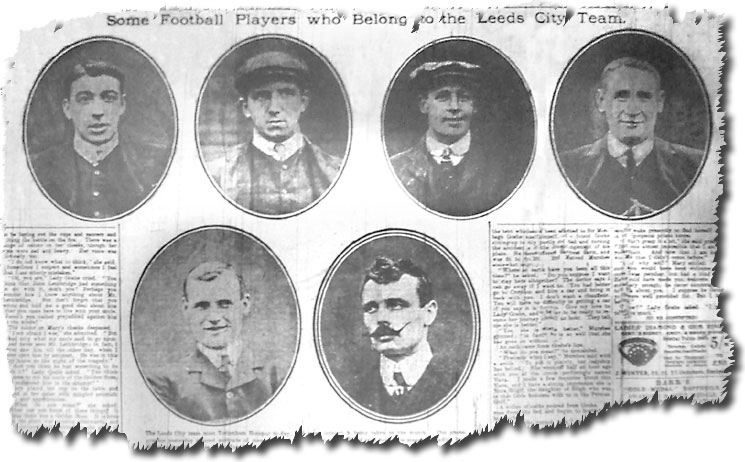 Part
2 - Results and table
Part
2 - Results and table
After three years with nothing to show for their efforts but steadily
emptying pockets, Leeds City parted ways with secretary-manager Gilbert
Gillies in February 1908, the Scot choosing
to go before he was pushed. Desperate to secure a passport to the top
flight of the English game, the directors identified Brighton and Hove
Albion manager Frank Scott-Walford
as the man to take the club forward.
Scott-Walford had overseen some plucky FA Cup performances in his three
years on the South Coast: the club made a spirited debut in his first
season, beating Swindon Town 3-0. In 1908, they did even better, winning
1-0 at First Division giants Preston North End before taking Liverpool
to a replay.
The Brighton board were reluctant to release the 36-year-old from the
final two years of a five-year contract, but the persistence of City's
directors eventually won the day. The appointment of the new general manager
was a real feather in the cap for them and they were happy to grant him
the carte blanche he requested. Flaneur in the Leeds Mercury: 'Mr
Scott-Walford has been given a much freer hand than was Mr Gillies, who
has now settled down comfortably at Bradford Park Avenue, and this should
be for the good of the club. Mr Gillies did admirably in the first season
of the Leeds City club, and had he been permitted to continue the team
building process, I do not think that the shareholders' meeting after
last season and the committee of inspection would have been necessary.'
Scott-Walford took up the reins at Elland Road on 1 April and saw his
new charges gain six points from six games to finish 12th, hinting at
better things to come.
He quickly gave notice of his intentions and the summer of 1908 brought
radical team rebuilding. Only ten of the squad (goalkeepers Tom Naisby
and Harry Bromage, full-backs William Bates and David Murray, half-backs
Stan Cubberley, Jimmy Kennedy and Charlie Morgan, and star forwards Fred
Croot, Jimmy Gemmell and Billy McLeod) were retained, with eleven men
departing. The biggest names to go were regular right wing pair Fred Parnell
and Bob Watson, both members of the Leeds side that made its Second Division
debut in 1905. They usually operated in tandem on City's right flank,
and had played more League games for the club thus far than anyone else
(104 and 83 respectively). Among the other leavers were Jack Lavery, Harry
Kay and Bob Jefferson, all signed 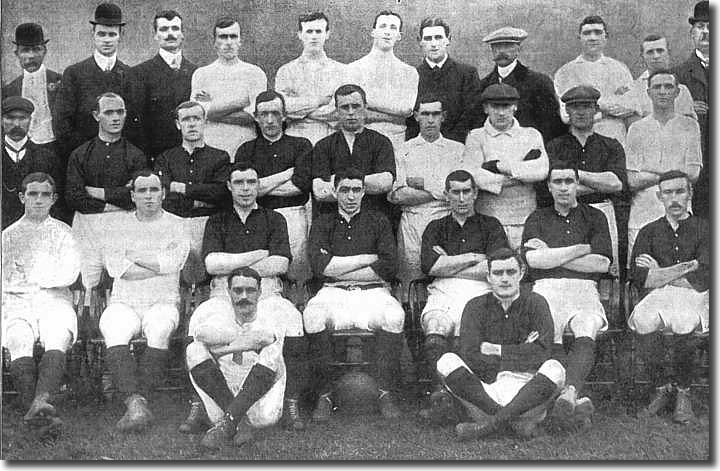 by
Swindon Town, while club captain Tom Hynds returned to Scotland with Hearts
after just a year at Elland Road.
by
Swindon Town, while club captain Tom Hynds returned to Scotland with Hearts
after just a year at Elland Road.
Scott-Walford reinforced his ranks with a host of new players, all from
the Southern League he knew so well. He returned to Brighton to sign Tom
Rodger, Dickie Joynes, Jimmy Burnett, David Dougal and Willie McDonald,
while Brentford yielded Tom McAllister, Jock Hamilton, John Watson and
Scottish centre-forward Adam Bowman; Southern League champions Queen's
Park Rangers provided full-back Jack White.
back to top
Brighton's Tom Morris was another target, but it was February before
a deal was clinched for the giant centre-half.
Bedding in the newcomers would take time, but hope was high for the new
season, with City's chances boosted by the fixture list. The Yorkshire
Evening Post: 'Under the Fletcher system the Elland Road organisation
are fortunate in having their first three Saturday matches at home with
the Spurs, Hull City and Derby County respectively, and the home match
with Barnsley has also been arranged for the 14th inst, Holbeck Feast
Monday.'
As well as the recruits, City also boasted a new kit - a novel old gold
pinstripe was added to the dark blue shirts giving them a distinctive
new look.
The opening match of the new season brought 1901 FA Cup winners Tottenham
Hotspur to Elland Road on 5 September - the Londoners had kicked off their
own campaign four days earlier with an enterprising 3-0 win against Wolves.
Scott-Walford knew Tottenham well, having begun his playing career there
as an amateur goalkeeper. He blooded seven newcomers, Watson, White (full-backs),
McAllister, Hamilton (half-backs), Joynes, Bowman and Rodger (forwards),
with Naisby (goalkeeper), Cubberley (half-back), Gemmell and Croot (forwards)
retaining their places. David Murray would probably have played but for
a cartilage injury, but there was some disquiet at Billy McLeod's omission
- he had proven himself an adept goalscorer. For now, it was Adam Bowman,
hat trick hero in a pre-season trial against the reserves, who played
centre-forward.
The new era had a triumphant start and Flaneur reported matters in the
Leeds Mercury:
'Had a stranger … dropped casually into the Elland Road ground at a quarter
past five on Saturday afternoon, he would not have considered it necessary
to ask which side had won. It would have been quite obvious to him … the
home team had gained the verdict. Had he observed further that Mr Scott-Walford
made a point of 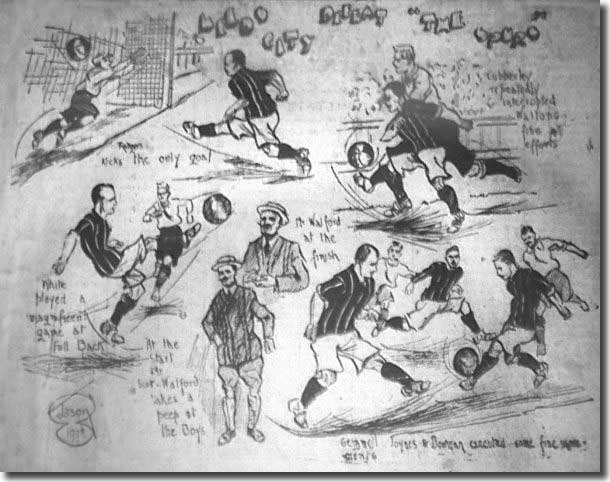 shaking
hands with each of the Leeds City players as the teams left the field,
he might have also deduced that the new manager of the club had passed
through an anxious hour and a half, and was very jubilant at the result.
And in both deductions he would have been correct.
shaking
hands with each of the Leeds City players as the teams left the field,
he might have also deduced that the new manager of the club had passed
through an anxious hour and a half, and was very jubilant at the result.
And in both deductions he would have been correct.
'The new Leeds City team had justified the faith of Mr Scott-Walford
in their powers by defeating the smart Tottenham Hotspur side by one goal
to none, and the manager had justified his position as sole selector,
in the eyes of the big crowd of nearly 20,000 people.
'I know enough of the average Leeds football spectator to feel sure that
had the City team suffered defeat in this first match, Mr Scott-Walford's
experiment in putting practically a new side into the field would have
been severely criticised. The new manager took a bold sporting chance
in selecting seven players who had previously not worn the Leeds City
colours - his original selection was eight, but at the last moment Cubberley
came in at left-half for McDonald, who is suffering from a bad eye - and
the venture was justified by its success.
'It would be absurd to laud the new team to the skies on the showing
of one match … but, without a single exception the men were triers, and
when spectators feel assured that their players are putting forth every
ounce they can excuse little weaknesses, and even forgive failures.'
Bowman, 'an admirable pivot', played a fine game, laying on a debut goal
for Rodger and linking the forwards skilfully, while Jock Watson, who
led the side, and Jack White had sterling debuts at full-back. The City
eleven did not fully gel but outplayed gifted opponents and did much to
reassure a cynical Leeds public.
However, the disappointing goalless draw that followed against Clapton
Orient brought a shower of critical letters in the Mercury. 'Another
Supporter' seethed, 'The present Leeds City team is not as good as the
one that was on show at Elland Road last season. They represent an outlay
of something about £2,000 and I would ask the team's supporters to compare
last year's team, which cost £200 only, got together by Mr Gillies who
had a free hand last year, with the present team. The first year's football
at Elland Road was by far the best, most encouraging and most satisfactory
we have had the pleasure of witnessing.'
Back came the more optimistic 'Enthusiast': 'If these so-called supporters
would wait and see a few more matches, and not condemn a team on playing
twice, it would save a lot of dissatisfaction both among the players and
spectators, as it was this kind of humbug which was one source of trouble
last season.'
It seemed that Frank Scott-Walford would suffer the same robust Yorkshire
scrutiny as his predecessor. Even so, 2-0 wins against Hull City and Barnsley
(Billy McLeod grabbing a brace of goals in the latter, his first appearance
of the season) left City sitting proudly at second place in the table,
yet to concede a goal. The doubters, it seemed, had spoken too soon.
Leeds were much brighter in those games, with Richard Guy, Jimmy Burnett
and McLeod offering more threat than previous combinations, though left
winger Fred Croot struggled to recapture the blistering form that made
him City's player of the year in 1907/08.
| |
Top of Division Two - 14 September 1908 |
| |
Pos
|
|
P
|
W
|
D
|
L
|
F
|
A
|
Pts
|
| |
1st
|
Birmingham
City |
4
|
4
|
0
|
0
|
11
|
3
|
8
|
| |
2nd
|
Leeds
City |
4
|
3
|
1
|
0
|
5
|
0
|
7
|
| |
3rd
|
Bolton
Wanderers |
4
|
3
|
0
|
1
|
6
|
2
|
6
|
| |
4th
|
Bradford
PA |
4
|
2
|
1
|
1
|
4
|
4
|
5
|
| |
5th
|
Tottenham
Hotspur |
3
|
2
|
0
|
1
|
7
|
1
|
4
|
| |
6th
|
Blackpool |
3
|
1
|
2
|
0
|
4
|
3
|
4
|
| |
7th
|
Burnley |
4
|
2
|
0
|
2
|
6
|
5
|
4
|
| |
8th
|
Wolverhampton
W |
4
|
1
|
2
|
1
|
5
|
6
|
4
|
| |
|
|
|
|
|
|
|
|
|
The club had every reason to welcome Derby County to Elland Road on 19
September; with Second Division leaders Birmingham City facing a stiff
trip to Fulham, there was a real chance that victory against the Rams
would see Leeds City assume leadership of the division.
back to top
It was a wonderful game, closely contested until the final half hour,
with two well-matched teams going at each other hammer and tongs. Derby
attacked for all they were worth, testing the City defence as they had
not been tested all season. County broke the deadlock after twenty minutes
when centre-half Ben Hall forced home a corner.
City responded immediately, Cubberley creating an opening. England keeper
Harry Maskrey threw himself full length at McLeod's low shot, but could
only touch the ball in off the post.
Back came Derby, and centre-forward Alf Bentley tapped the ball home
from close range after Fred Bevan manufactured the opening.
It took City until the stroke of half time to get back on terms. McLeod
burst through the County defence only to be brought down in the area.
The referee had no hesitation in pointing to the spot and McLeod stepped
up to notch his fourth goal of the season, though the luckless Maskrey
again got his fingers to the ball.
The score reflected the closeness of the contest and it was anybody's
game. With thirty minutes to go, Derby took the lead through Bentley,
who promptly netted again to complete his hat trick. Bevan added his second
and Derby's fifth goal shortly afterwards to give the scoreline a flattering
look as City heads dropped. In the end, Leeds were well beaten by a team
at the top of their game.
Defeats followed at Blackpool and Chesterfield without City troubling
the scorers, and they slid down the table.
Some spirit was restored with a goalless draw away to Glossop North End
before a 2-1 victory over Stockport County at Elland Road, achieved mainly
through some bizarre goalkeeping from Jimmy Molyneux, as reported by Linesman
in the Mercury:
'Molyneux was badly at fault in connection with both the goals scored
by Leeds City … The game had only been about twenty minutes in progress
when a smart bit of tackling by Kennedy resulted in the centre-half putting
McLeod in possession. The City centre made straight for goal with one
of his characteristic dashes, and, cleverly evading the backs, he let
drive hard and low at Molyneux from fifteen yards range. The custodian
got down to the ball and appeared certain to gather it, but the ball flew
out of his hands and passed over his head into the net. This was a small
mistake, however, compared with that which presented Leeds City with their
second goal.
'Following McLeod's opening goal, Stockport immediately equalised through
Whitehouse, the inside-right, who gave Naisby no chance to stop a high
shot at close range. Thus the game stood till close on the interval, when
Leeds City secured the lead with a sensational goal. Rodger burst away
on the right, and Molyneux foolishly came out of his charge. After a short
tussle with Waters, the left-back, Rodger sent in a long, high shot, and
the ball sailed over the head of Molyneux. It hit the bottom of the far
upright, however, and bounced back to the custodian's feet. Molyneux made
to pick it up, but he stumbled and actually sent the ball trundling back
into his own goal.'
After their poor run, City were in no mood to look any gift horse in
the mouth and eagerly accepted their first win in five matches. They stumbled
to defeat on 24 October at West Bromwich Albion with City's previously
reliable full-backs, Jock Watson and Jack White, having a nightmare. A
misunderstanding between the two led to the first Albion goal, while the
second was down to Watson, who took the ball away from Tom Naisby in an
attempt to dribble out of trouble, only to lose possession and allow Fred
Buck to score. McLeod's fifth goal in eight games was mere consolation.
It was a sad outcome, and Wanderer commented in the Mercury: 'There
are one or two improvements necessary in the team … and if the directors
wish to see the club on a flourishing condition 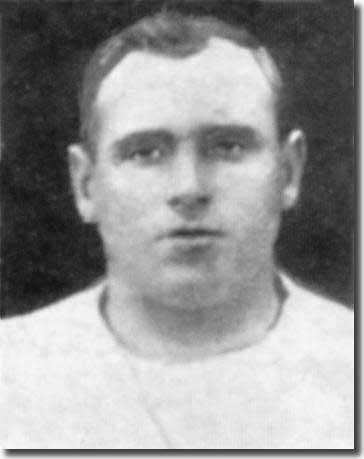 they
should at once find the necessary material to make good the deficiencies.
It is no use sitting still and hoping for better things. Prompt action
is necessary.' By now, the club had reintroduced a Selection Committee,
reportedly to assist Frank Scott-Walford, though it smacked of the directors'
perpetual penchant for meddling with team affairs.
they
should at once find the necessary material to make good the deficiencies.
It is no use sitting still and hoping for better things. Prompt action
is necessary.' By now, the club had reintroduced a Selection Committee,
reportedly to assist Frank Scott-Walford, though it smacked of the directors'
perpetual penchant for meddling with team affairs.
There was no relief with the final day of October bringing Division Two
leaders Birmingham, who had dropped just four points from their ten games,
to Elland Road.
However, City rose admirably to the occasion, as reported by Linesman:
'In beating Birmingham by two goals to nil at Elland Road, Leeds City
created one of the surprises of the day, for few could have anticipated
the failure of the leaders. Leeds City undoubtedly deserved their success,
and they are to be congratulated on their performance. They played good
football - better, by a long way, than I have seen them play since the
season started. It was probably their best display of the season, and
the fifteen thousand spectators were highly delighted. At the interval,
when Leeds City led by a goal, the players were heartily cheered, and
at the end of the game there was a remarkable demonstration of enthusiasm,
which lasted several minutes.'
Both goals followed free kicks, with the deadly McLeod once more making
the difference. Jimmy Kennedy's effort rebounded off a Birmingham defender
and John Watson lobbed the ball into the area for the centre-forward to
tap home the opening goal. Local papers at the time credited McLeod with
both goals, though the second was eventually awarded to Tom Rodger.
It was heartening to see City suggest they could be a force to reckon
with and the Birmingham triumph marked the start of a six game unbeaten
run. City hammered Grimsby Town 4-1 and followed up with an enterprising
single goal victory at Fulham, with Watson and White starring in defence,
and McLeod taking his tally for the season to eleven goals in eleven games.
The most encouraging result, though, came on 12 December when Elland Road
hosted Cup holders Wolverhampton Wanderers.
back to top
The Black Country club were among the founder members of the Football
League in 1888 and had spent 18 years in the top flight before relegation
in 1906. They had won the FA Cup by beating First Division giants Newcastle
United 3-1 at Crystal Palace, and though they were not having the best
of times in the League they remained formidable opponents.
In the Leeds City side, Dickie Joynes, Jimmy Gemmell, Tom Rodger and
Fred Croot were the regular foils up front for Billy McLeod, but Rodger
('the artist of the line, his dribbling being tricky and effective') fell
ill after the Fulham victory, to be replaced by Richard Guy on the right
wing. The former Bradford City outside-right had a tremendous time of
things against Wolves, as reported by Linesman: 'It was indeed a fortunate
circumstance that led to the re-inclusion of Guy. Guy had already figured
in the team without accomplishing anything brilliant, but he seized his
opportunity on Saturday with both hands (and feet), and showed so much
dash and skill as to make himself the most outstanding forward on the
field.'
28-year-old Guy had started his senior career with Manchester City in
1902 before joining Bradford City a year later and scoring their first
ever goal. He never established himself at Valley Parade, and spent several
years in the Second Division of the Southern League with Hastings and
St Leonards before Frank Scott-Walford offered him another shot at the
big time. The clash with Wolves represented the height of the fair-haired
winger's footballing career.
The goalscoring action started within five minutes of kick off when 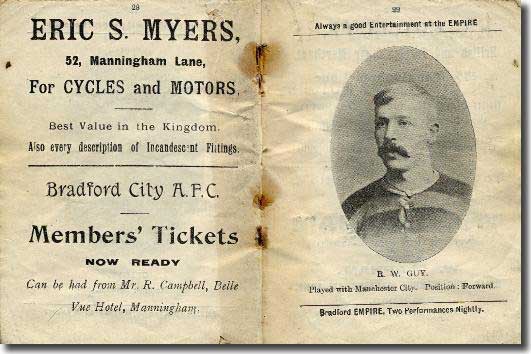 Guy
shrugged off full-back Ted Collins and found space on the right. He made
ground down the touchline before firing over a smart centre for McLeod
to nod beyond goalkeeper Tommy Lunn's reach. It was a beautiful goal and
set the Peacocks up for a marvellous afternoon.
Guy
shrugged off full-back Ted Collins and found space on the right. He made
ground down the touchline before firing over a smart centre for McLeod
to nod beyond goalkeeper Tommy Lunn's reach. It was a beautiful goal and
set the Peacocks up for a marvellous afternoon.
City's second came after 25 minutes when Jimmy Kennedy began a move that
Gemmell, McLeod and Joynes took up to feed Guy on the right. The winger's
cross flew across the area but missed its mark. Croot screwed it back
with a clever touch and Gemmell slammed the ball past the keeper with
a stinging ground shot.
City went in at the interval with a 3-0 advantage after another goal
involving Guy. He passed inside to Joynes, who laid it off to McLeod.
The centre-forward's shot was blocked by Lunn, but ran free for Gemmell
to hammer home with a full blooded drive.
Wolves finally hinted at their class after the resumption and dominated
affairs for the first quarter of an hour as City rested on their laurels.
Centre-forward George Hedley turned in Payne's centre from close range
with the Leeds defenders AWOL.
The shock seemed to stir City from their complacency and within five
minutes of Wanderers scoring they had raced into a 5-1 lead. Gemmell completed
his hat trick by volleying home another Guy centre, and within seconds
the roles were reversed: Gemmell's fiery shot was blocked by Lunn, and
Guy raced in to slip the ball home and crown an impressive display.
The game was all but over as a contest, and even when Joynes had to be
carried off, Wolves never threatened a real comeback. In the closing minutes
they sneaked a consolation through inside-right Blunt after a defensive
mix up.
Linesman in the Mercury: 'No doubt there were many among the fourteen
thousand spectators who had turned out chiefly to see the Cup holders,
and these spectators must have got a tremendous disappointment. It was
not Cup winning Wolves they witnessed, but Wolves without fangs, Wolves
with hardly a spark of vitality in them, Wolves so worried that they hardly
knew which way to turn. The Wolves did not show as much football on Saturday
as would win the West Yorkshire Cup. Those who expected to see a good
football match were disappointed, but they were compensated to a large
extent by seeing really good football played by Leeds City. Without a
doubt, the play of Leeds City was often brilliant, and of such a class
as they have seldom shown previously.
'In view of Guy's performance, the problems of the Leeds City right wing
would appear to be solved, for the fair haired outside-right undoubtedly
earned his place, and it is to be hoped he will keep it. The other members
of the forward line all did well, with the exception of Croot, the outside-left,
not being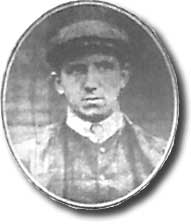 in the picture so much as usual. McLeod and Gemmell were both excellent,
Kennedy again distinguished himself at centre-half, and overshadowed his
colleagues in the line, though both worked hard, McDonald proving a capable
substitute for Cubberley. Little fault could be found with Watson or White
at back or Naisby in goal. Altogether it was a great day for Leeds City,
and after this and recent displays their followers may be pardoned for
beginning to study the team's chances of promotion.'
in the picture so much as usual. McLeod and Gemmell were both excellent,
Kennedy again distinguished himself at centre-half, and overshadowed his
colleagues in the line, though both worked hard, McDonald proving a capable
substitute for Cubberley. Little fault could be found with Watson or White
at back or Naisby in goal. Altogether it was a great day for Leeds City,
and after this and recent displays their followers may be pardoned for
beginning to study the team's chances of promotion.'
It might have been thought that such a well-crafted and clinically realised
triumph would provide the kick-start for City's season. However, football
in Leeds has rarely been either predictable or straightforward, as Frank
Scott-Walford was to learn to his cost.
Part 2 - Results and table
Other Football Highlights from 1908/09
- Newcastle United won the league championship, their third in five
seasons, despite crashing 9-1 at home to North East rivals Sunderland.
They finished seven points clear of runners up Everton and Sunderland
were a further two points away in third
- Reigning champions Manchester United beat Bristol City 1-0 in the
final to win the FA Cup for the first time in their history. United
were also the first winners of the FA Charity Shield when they beat
Southern League winners Queen's Park Rangers 4-0 in a replay after a
1-1 draw
- England won the Home Internationals with a maximum 6 points and then
represented the United Kingdom in the London Olympic Games, winning
the gold medals by beating Denmark 2-0 in the final at the White City
stadium. England's star was the dedicated amateur centre forward Vivian
Woodward, who scored 29 goals in 23 full internationals and another
50 in amateur internationals. Woodward got the second goal in the final
back to top












 by
Swindon Town, while club captain Tom Hynds returned to Scotland with Hearts
after just a year at Elland Road.
by
Swindon Town, while club captain Tom Hynds returned to Scotland with Hearts
after just a year at Elland Road. shaking
hands with each of the Leeds City players as the teams left the field,
he might have also deduced that the new manager of the club had passed
through an anxious hour and a half, and was very jubilant at the result.
And in both deductions he would have been correct.
shaking
hands with each of the Leeds City players as the teams left the field,
he might have also deduced that the new manager of the club had passed
through an anxious hour and a half, and was very jubilant at the result.
And in both deductions he would have been correct. they
should at once find the necessary material to make good the deficiencies.
It is no use sitting still and hoping for better things. Prompt action
is necessary.' By now, the club had reintroduced a Selection Committee,
reportedly to assist Frank Scott-Walford, though it smacked of the directors'
perpetual penchant for meddling with team affairs.
they
should at once find the necessary material to make good the deficiencies.
It is no use sitting still and hoping for better things. Prompt action
is necessary.' By now, the club had reintroduced a Selection Committee,
reportedly to assist Frank Scott-Walford, though it smacked of the directors'
perpetual penchant for meddling with team affairs. Guy
shrugged off full-back Ted Collins and found space on the right. He made
ground down the touchline before firing over a smart centre for McLeod
to nod beyond goalkeeper Tommy Lunn's reach. It was a beautiful goal and
set the Peacocks up for a marvellous afternoon.
Guy
shrugged off full-back Ted Collins and found space on the right. He made
ground down the touchline before firing over a smart centre for McLeod
to nod beyond goalkeeper Tommy Lunn's reach. It was a beautiful goal and
set the Peacocks up for a marvellous afternoon. in the picture so much as usual. McLeod and Gemmell were both excellent,
Kennedy again distinguished himself at centre-half, and overshadowed his
colleagues in the line, though both worked hard, McDonald proving a capable
substitute for Cubberley. Little fault could be found with Watson or White
at back or Naisby in goal. Altogether it was a great day for Leeds City,
and after this and recent displays their followers may be pardoned for
beginning to study the team's chances of promotion.'
in the picture so much as usual. McLeod and Gemmell were both excellent,
Kennedy again distinguished himself at centre-half, and overshadowed his
colleagues in the line, though both worked hard, McDonald proving a capable
substitute for Cubberley. Little fault could be found with Watson or White
at back or Naisby in goal. Altogether it was a great day for Leeds City,
and after this and recent displays their followers may be pardoned for
beginning to study the team's chances of promotion.'